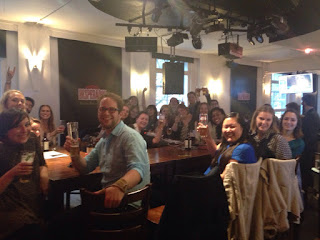To the uninitiated however, when walking around the area there's actually very little obvious evidence of this. The blue plaques are for architects, economists, the founder of Pakistan, and, of course, the mistress of Prince Frederick Duke of York.
The places that make Bloomsbury thrive as a hub of literary culture are often only known by those who are interested in knowing about them. You have to know that they are there to truly appreciate them. You could walk straight past the University of London Senate House and never know that it was the inspiration for George Orwell's Ministry of Truth. The British Library is an intimidating creature to even the most bookish of worms and the beauty of the Charles Dickens Museum lies in the fact that it looks just like any other house.
There is, of course, the labyrinthine treasure-trove that is the Gower Street Waterstones. When charged with our #literaryme task in our first week it was, without hesitation, the first stop for the majority of us publishing students. It is our siren call; we cannot walk past without entering, and when we inevitably step through those glimmering doors, leaving, particularly without having made a purchase, requires an iron will. And perhaps also a heart of stone.
It is our love of books that brought us all to UCL, and thus to Bloomsbury. We, this new year of students to the masters course, have brought with us a our love of books and writing and publishing from all over the world, hoping to one day leave our mark in this literary community. We are the new generation of literary Bloomsbury. We are the future publishers, editors, designers, authors, and illustrators of the industry and we begin our journey in this hub of literary history with the hope that it's creativity and culture might rub off on us in our future careers.
You never know, maybe one of us will give UCLU's The Library the same reputation George Orwell gave The Fitzroy Tavern. That's the dream, right?
You can continue to shove us into the dark basements of the various buildings of University College London but you will not break our spirit. That is, unless you force us to dissect our beloved again. That one may not go down so well.
Thanks for reading,
Naomi Joy x
The places that make Bloomsbury thrive as a hub of literary culture are often only known by those who are interested in knowing about them. You have to know that they are there to truly appreciate them. You could walk straight past the University of London Senate House and never know that it was the inspiration for George Orwell's Ministry of Truth. The British Library is an intimidating creature to even the most bookish of worms and the beauty of the Charles Dickens Museum lies in the fact that it looks just like any other house.
There is, of course, the labyrinthine treasure-trove that is the Gower Street Waterstones. When charged with our #literaryme task in our first week it was, without hesitation, the first stop for the majority of us publishing students. It is our siren call; we cannot walk past without entering, and when we inevitably step through those glimmering doors, leaving, particularly without having made a purchase, requires an iron will. And perhaps also a heart of stone.
It is our love of books that brought us all to UCL, and thus to Bloomsbury. We, this new year of students to the masters course, have brought with us a our love of books and writing and publishing from all over the world, hoping to one day leave our mark in this literary community. We are the new generation of literary Bloomsbury. We are the future publishers, editors, designers, authors, and illustrators of the industry and we begin our journey in this hub of literary history with the hope that it's creativity and culture might rub off on us in our future careers.
You never know, maybe one of us will give UCLU's The Library the same reputation George Orwell gave The Fitzroy Tavern. That's the dream, right?
You can continue to shove us into the dark basements of the various buildings of University College London but you will not break our spirit. That is, unless you force us to dissect our beloved again. That one may not go down so well.
Thanks for reading,
Naomi Joy x








